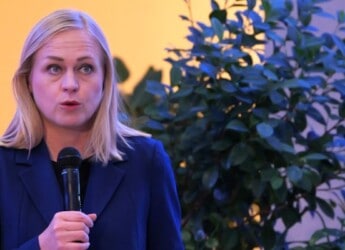Editor’s Note: This coverage by ComplexDiscovery Staff delves into the pivotal panel discussion at the Tallinn Digital Summit 2024, focusing on “Outinnovating the Opponent: Navigating AI, Cybersecurity, and Ethics in the Future of DefenceTech.” Against the backdrop of geopolitical tensions and technological disruption, this session highlighted critical intersections between innovation and defense, underscoring the challenges and opportunities facing Europe and democratic allies worldwide.
Featuring insights from industry leaders such as Kadi Silde (Helsing AI), Kusti Salm (Frankenburg Technologies), and Andrea Bugar (Airbus Defence and Space), the panel, led by journalist and media personality Majorie Paillon, explored topics ranging from scalable AI-driven solutions and multi-domain combat clouds to ethical considerations and cybersecurity. With pressing global security challenges and the resurgence of conventional warfare, the session emphasized the urgency of collaboration, funding reform, and scalable innovation.
Content Assessment: Tallinn Digital Summit Panel Explores DefenceTech's Future in AI, Cybersecurity, and Ethics
Information - 94%
Insight - 94%
Relevance - 92%
Objectivity - 92%
Authority - 95%
93%
Excellent
A short percentage-based assessment of the qualitative benefit expressed as a percentage of positive reception of the recent article from ComplexDiscovery OÜ titled, "Tallinn Digital Summit Panel Explores DefenceTech's Future in AI, Cybersecurity, and Ethics."
Industry News – Geopolitical Beat
Tallinn Digital Summit Panel Explores DefenceTech’s Future in AI, Cybersecurity, and Ethics
ComplexDiscovery Staff
Tallinn, Estonia – At the Tallinn Digital Summit 2024, a panel discussion titled “Outinnovating the Opponent: Navigating AI, Cybersecurity, and Ethics in the Future of DefenceTech” brought together industry and defense leaders to examine the challenges and opportunities in reshaping military technology. Moderated by journalist Marjorie Paillon, the session featured Kadi Silde, Director of European Engagement at Helsing AI; Kusti Salm, CEO of Frankenburg Technologies; and Andrea Bugar, SVP of Defence Digital Germany and International at Airbus Defence and Space GmbH.
Against the backdrop of Russia’s invasion of Ukraine and a rapidly shifting geopolitical landscape, the panel addressed key issues such as ethical AI, multi-domain combat, cybersecurity, and Europe’s fragmented defense funding systems. The discussion served as a timely reminder of the urgent need for innovation, scalability, and collaboration in modern defense strategies.
The Context: A New Era of Warfare
“The battlefield of tomorrow is being coded today—a perspective that almost seems political sci-fi,” moderator Marjorie Paillon remarked in her opening. With AI and autonomous systems already augmenting military capabilities in active conflict zones, the discussion tackled critical questions about the intersection of technological advancements and ethical imperatives.
As conflicts grow more complex, Europe faces a dual challenge: defending its borders while navigating the evolving rules of war, particularly in an era where seconds—and bytes—can determine outcomes.
Combat Clouds and Multi-Domain Superiority
Andrea Bugar from Airbus Defence and Space initiated the conversation by introducing the “multi-domain combat cloud,” a cutting-edge system that integrates data from air, land, maritime, space, and cyber domains. She explained how such a system allows for real-time situational awareness, faster decision-making, and greater operational tempo.
“Milliseconds will make the decisive difference between survival and destruction in a contested military environment,” Bugar stated. The combat cloud, she elaborated, accelerates the OODA loop (observe, orient, decide, and act), providing common situational awareness and allowing for distributed, collaborative combat.
Unlike traditional commercial cloud systems, the multi-domain combat cloud is designed to be decentralized, cyber-resilient, and adaptable. It aims to ensure interoperability across platforms while enhancing cybersecurity—an essential factor as digital and kinetic threats converge. Bugar stressed that achieving this level of integration requires openness: “You have to be system-agnostic because otherwise, it’s not feasible to integrate new systems easily.”
The broader challenge, Bugar noted, lies in balancing the adoption of new technologies with the modernization of legacy platforms. “It’s not about replacing everything,” she said, “but about ensuring current assets are integrated into future systems.”
Scalability and Cost: A Call for Change
Shifting the focus to scalability and affordability, Kusti Salm offered a sobering critique of Europe’s defense industry. “Things are too expensive. And there’s too little supply,” he declared, pointing to inefficiencies that hinder Europe’s ability to meet modern threats.
Salm emphasized how traditional air defense systems, built to counter high-performance threats like fighter jets and ballistic missiles, are ill-equipped to handle the growing threat of low-cost, high-volume drones such as the Shahed models. “Until we don’t have cheaper solutions, this is going to remain like that,” Salm warned.
He also highlighted the disconnect between Europe’s rhetorical commitments to defense and its actual investments. “In 2024, in real terms—adjusted for inflation—European nations are spending less on defense than they did in 2021 before the war,” Salm noted. He called for dramatic increases in defense manufacturing and investment to match the scale of modern threats.

Ethical AI: Serving Democracies
Representing Helsing AI, Kadi Silde addressed the role of ethical AI in defense, stressing the company’s commitment to working exclusively with democratic nations. “We believe fundamentally that we need to give back or retain the technological AI edge in this technology for democratic nations,” Silde explained.
While remaining tight-lipped about specific products due to Helsing’s partnerships with Ukraine, Silde described the company’s focus on both reconnaissance and strike capabilities. “We need mass, but we need intelligent mass,” she said, underscoring the importance of scalable, AI-driven solutions that can adapt to rapidly changing battle conditions.
Silde also highlighted systemic challenges in Europe’s defense funding model. She pointed out that while the European Union heavily invests in R&D, it lacks mechanisms to transition from research to production contracts. “The key is how do you switch from this sort of grant-based R&D funding to actually getting contracts that will deliver actual capabilities,” she said.
The Debate: Technology, Security, and Urgency
In the discussion segment, the panelists tackled questions about the security of defense technologies in an era of hybrid threats. Using Starlink as an example, Paillon asked how European systems could ensure interoperability and security in unpredictable environments.
Bugar reiterated the importance of cybersecurity and open architectures, noting that Airbus has strengthened its capabilities by acquiring specialized firms. Silde agreed but cautioned against viewing ethics and effectiveness as competing goals. “If we want to deploy in democratic countries, you just need to follow certain rules,” she said, adding that AI assurance is not only an ethical consideration but also a business imperative.
Salm, however, argued for pragmatism, pointing out that immediate battlefield needs often overshadow these concerns. “How many times have Ukrainians asked for cybersecurity in their weapons list? Zero times,” he stated. “They need something that can confront the mass.”
The Path Forward: From Crisis to Innovation
The panel concluded with a forward-looking discussion on transitioning defense innovations to peacetime applications. Bugar noted that defense-funded R&D has historically driven civilian innovation, citing examples like the internet and GPS. “We must avoid repeating the mistakes of reducing our self-defense capabilities during peacetime,” she warned.
Silde expressed optimism about the potential for automation to revolutionize defense production. “We’re seeing very, very interesting companies coming into this sector,” she said, predicting a shift toward faster, more scalable manufacturing processes.
For Salm, the priority remains clear: “First, we need to win the war in Ukraine and establish peace on terms favorable to us. If the terms are favorable to Russia, we’ll keep chasing shadows.”
News Sources
- Tallinn Digital Summit. (2024, November 19). Outinnovating the Opponent: Navigating AI, Cybersecurity, and Ethics in the Future of DefenceTech [Panel discussion]. Tallinn Digital Summit 2024, Tallinn, Estonia. Participants: K. Silde (Helsing AI), K. Salm (Frankenburg Technologies), A. Bugar (Airbus Defence and Space GmbH), and M. Paillon (Moderator).
- Tallinn Digital Summit
- Tallinn Digital Summit – Speakers
- TDS 2024 Panel: Outinnovating the Opponent
Assisted by GAI and LLM Technologies
Additional Reading
- From Moscow to Pyongyang: Cyber Threats Revealed by Sandra Joyce at the Tallinn Digital Summit
- OECD Releases Digital Economy Outlook 2024, Volume 2, at Tallinn Digital Summit
- Tallinn Digital Summit 2024 to Focus on Securing the Digital Tomorrow
Source: ComplexDiscovery OÜ


























